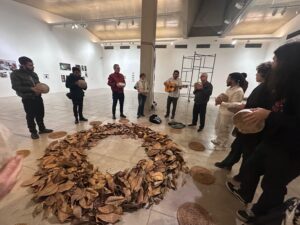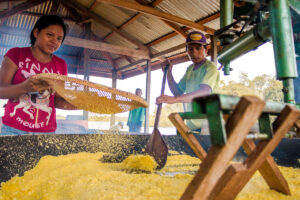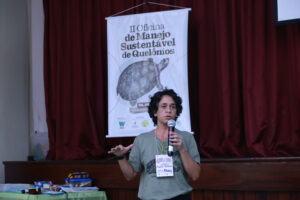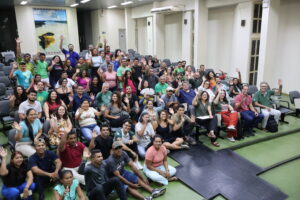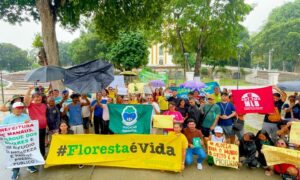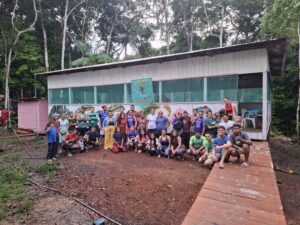The Agro-extractivist Women’s Association of Middle JuruáA (ASMAMJ) met to align goals, to monitor Strategic Planning, and participate in the 2nd edition of the Project Development and Management Course.
By Thais Vieira Alves and Maria Cunha
From June 26th to 30th, 2023, the I Board Meeting of ASMAMJ, and the Project Development and Management Course took place in São Raimundo community, within the Middle Juruá Extractive Reserve (RESEX), in the municipality of Carauari (AM). These events were key outcomes of the institutional strengthening project of ASMAMJ, in partnership between Instituto Juruá and Sitawi. These dialogical and participatory spaces of construction represent the importance of social organization in their genesis and contribute to the materialization of the foundations of sustainability.
The program started in the evening of June 26th with the screening of the documentary “Seiva Bruta” and cine debate with the online participation of photographer, creator and director Fernanda Preto. On the following day, June 27th, the I Board Meeting of ASMAMJ took place which was a moment of great importance that included lessons about Associativism and Leadership, Institutional Presentation of ASMAMJ, Strategic Planning for 2022-2024. The hybrid meeting (face-to-face – virtual) to discuss the report of the project Corpo Memória (Body Memory) which resulted in the film “Seiva Bruta”.
The board program included two evening sessions to discuss the Gender and Youth Diagnoses in the productive chain of Mid-Juruá. The research was conducted based on the demand and perception of ASMAMJ regarding the participation of women and youth in the sociobiodiversity productive chain which does not always have the proper visibility and recognition. In this occasion, according to the socio-environmental analyst from IJ Nathália Messina, “the director express special attention about topics related to teenage pregnancy, early sexual initiation, and child marriage, considering the data that reveals girls having children at the age of 12, 13, and 14 years old – a reality that still permeates the current generation”. Another strong point of discussion about the proper value and recognition was how “women actively engage in the productive chain of the region, but don’t receive the proper recognition for their work”, affirms the analyst and researcher of this study.
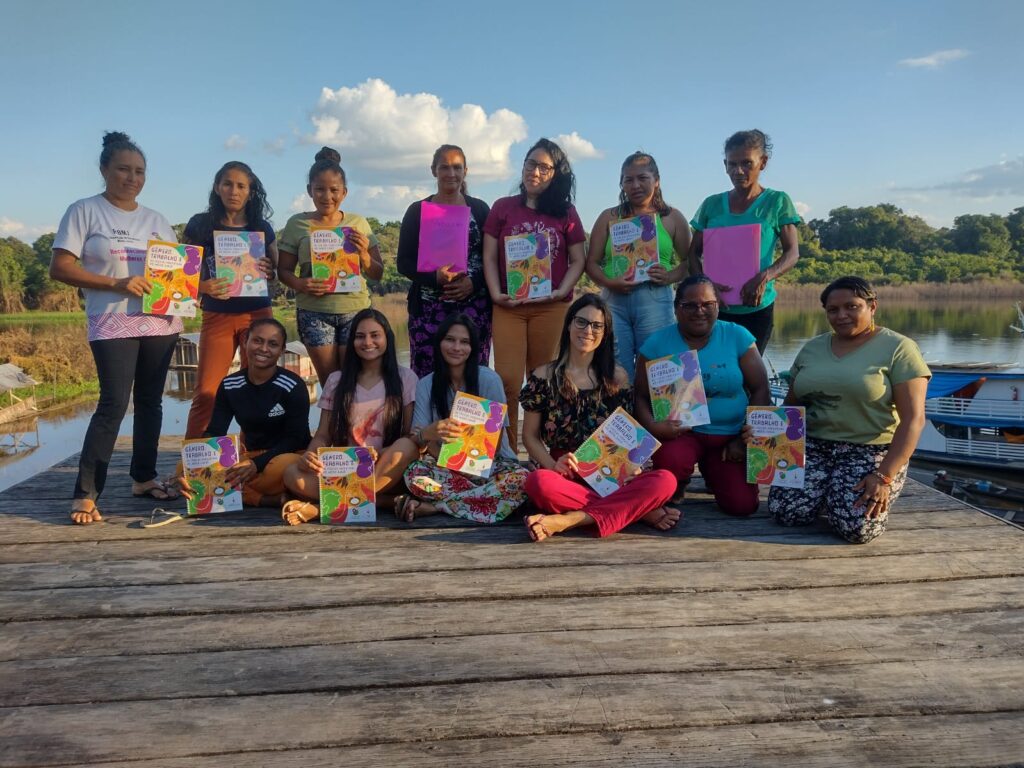
Right after the meeting, on 28th June, the Project Development and Management Course began and continued until June 30th, with the participation of board members and some associates of ASMAMJ. The first edition of the course was offered online by Instituto Juruá in 2021, during the pandemic period, using video lessons and practical exercises for various associations in the Mid-Juruá accessible on Instituto Juruá YouTube channel. The course is in demand from several social organizations in the region, especially those seeking to enhance their techniques in grant proposal writing and resource mobilization.
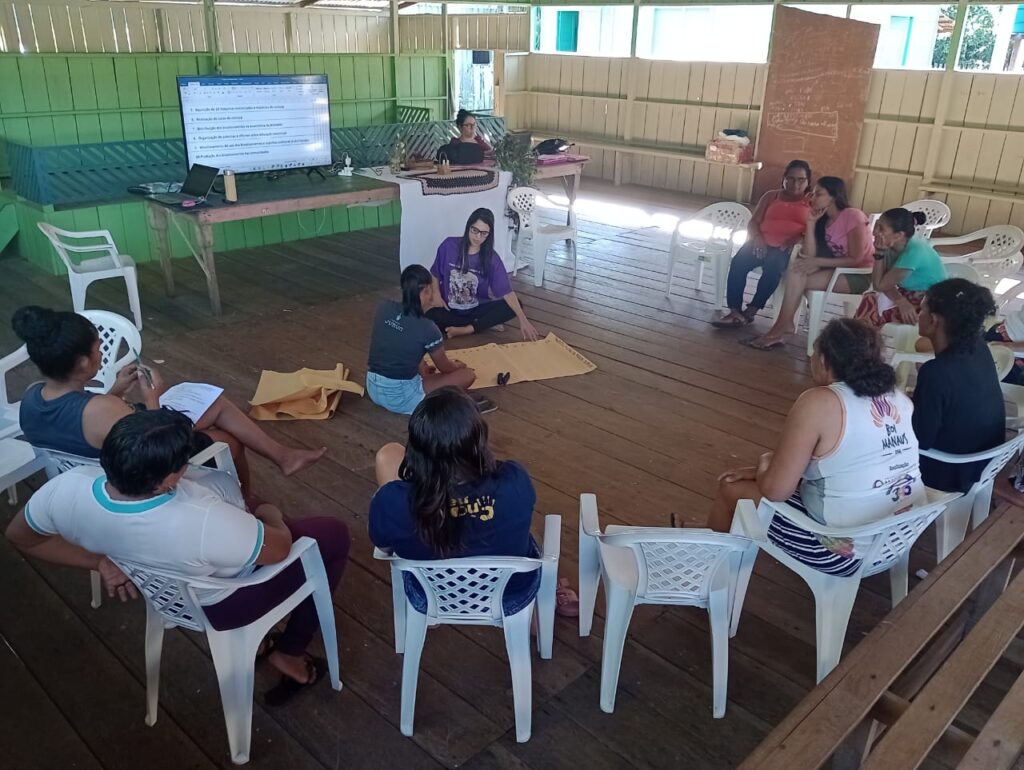
Due to the opportunity to resume the Project Development and Management Course, new elements were introduced to financial management and overall project coordination, with practical and theoretical lessons that considered case studies relevant to the reality of ASMAMJ, such as Fundo Casa and FPS (Fund for Social Promotion), as relates Messina. In addition, the mentioned socioenvironmental analyst, were present the local coordinator (Almira Silva), the financial and administrative analyst (Sarah Farias), and the communicator and local educator (Maria Cunha) – the four of them are part of the technical team from Instituto Juruá, who made themselves available to ASMAMJ to the community Strengthening Program led by the Education and Training Department. The report presented by Instituto Juruá to Sitawi indicates some outcomes achieved during this immersion week with ASMAMJ, as depicted in the following image:
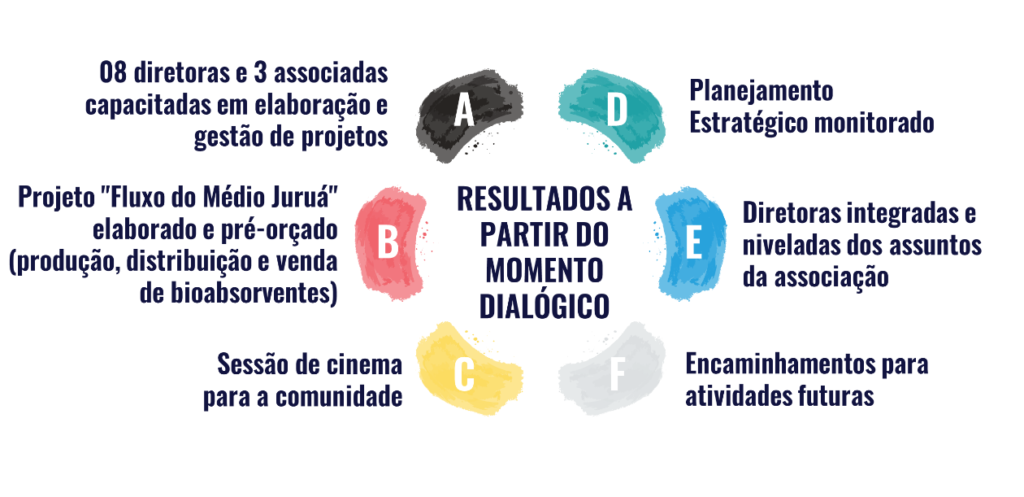
For Maria Cunha, who not only represents Instituto Juruá but is also a community member of São Raimundo and associated with ASMAMJ, the initiative of the project development and management course had a great importance. In her view it is evaluated as essential for the association’s development, once the trained board can demand much more with the development of projects and activities managed by association. An important element she mentioned is the sharing (decentralization) of leadership and the management within ASMAMJ is also involving the communities and sectors for the improvements of activities. “Having a shared management and empowered board directors, the associations can perform better in terms of articulations and expected results inside and outside the organization ”, Maria reflects.
Eliana Figueiredo, a director of ASMAMJ who participated in the immersion, highlights the importance of knowing where to start when developing a project. “It was very important because I know that in an association the participation of each board member is important, (knowing) what each person’s role is. I also found it important because I didn’t even know how to start writing a project, and I didn’t learn everything, but at least a little”.
Antônia Cunha, also a director of ASMAMJ, emphasizes the importance of understanding the stages of a project development. “As a director, I learned about things I didn’t even know, for instance, project development. I had no idea how to develop a project. Every day we can learn more and obtain more knowledge. It was important and rewarding to me, really. The day we spent there was worthwhile, it was really good for me.”
Given the positive impact of the dialogical meetings (ASMAMJ Board meeting of and Project development and management course), it is essential to continue activities that aim to strengthen the organization. For Rosângela Cunha, president of ASMAMJ, this is crucial because there are challenges that can discourage women along their path, including society issues such as sexism. “Female empowerment is growing every day in our communities. This is because we have strong women who face challenges, humiliations and societal disregard”.
The representation of ASMAMJ to the Mid-Juruá region is huge, especially in materializing the strength, the knowledge, and the sensibility of women in various activities of the organization with tangible and significant results. The president also highlights the importance of strengthening even more the partnership and practical solutions for all to be empowered in project development and management. “Instituto Juruá has been a great partner for ASMAMJ and the course is another solution for the ASMAMJ board to feel more confident that together we wave our stories”, says Rosângela.
Various organizations collaborated in the realization of the Board meeting and the Project Development and Management, including: Agroextractivist Women’s Association for the Mid-Juruá (ASMAMJ), Instituto Juruá, São Raimundo Community Residents Association (AMECSARA), and Sitawi – Finanças do Bem.

